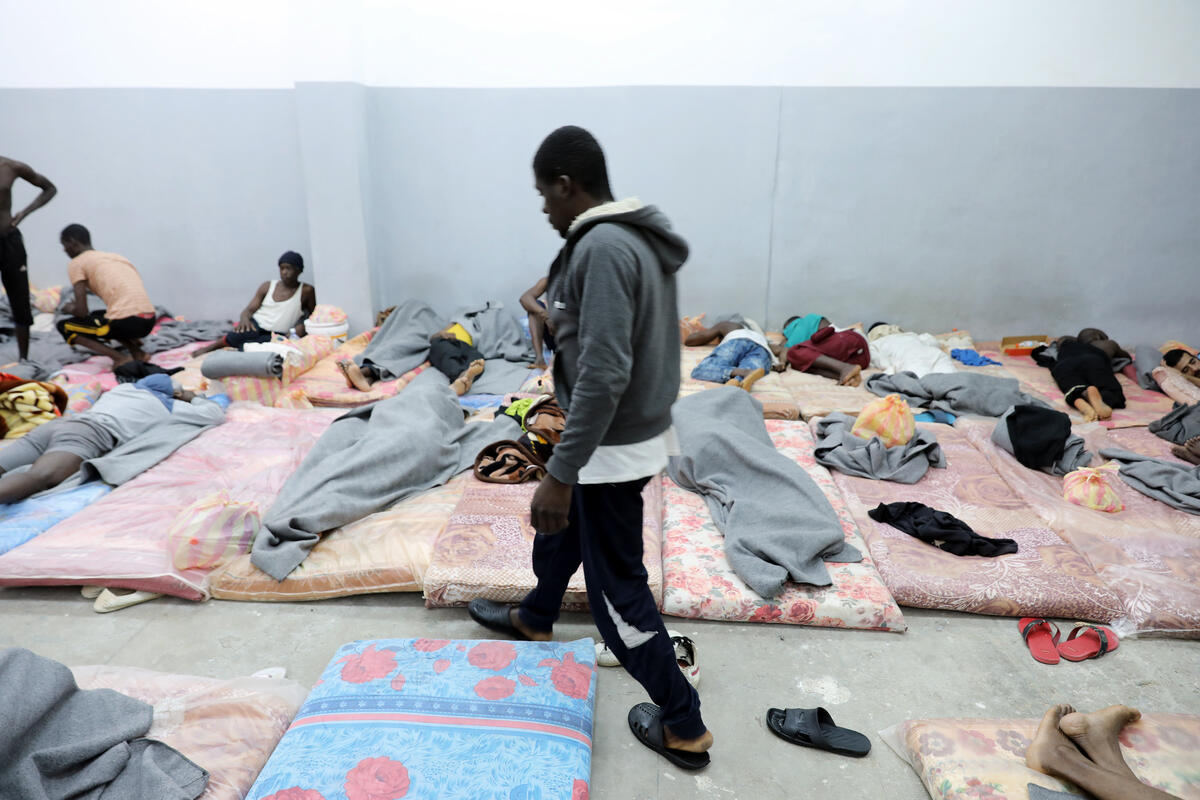Statement to the United Nations Security Council
Statement to the United Nations Security Council

Refugees and migrants sleep on the floor at Tariq al-Sikka detention facility in Tripoli, Libya, in May 2017.
Mr. President,
Distinguished Delegates,
The grave abuses perpetrated against migrants and refugees along the Central Mediterranean routes can no longer be ignored. I am glad that the Council has decided to address this compelling matter.
More than 116,000 people have crossed the sea to Italy alone in 2017. We should not forget that many of those arriving – or who end up stranded, or dying, along the way – are refugees fleeing conflict and persecution, of direct concern to UNHCR.
As I said in my statement to you, the Security Council, just a few weeks ago, the international community’s inability to prevent and resolve conflict is at the root of their plight.
Compelled to flee, but without legal pathways to safety, refugees are exposed to appalling harm, together with migrants – including torture, rape, sexual exploitation, slavery and other forms of forced labour.
These proliferate where governance is weak and transnational criminal networks take root. This requires a comprehensive approach encompassing countries of origin, transit, and destination.
Strengthening refugee protection and offering solutions along the routes is key. UNHCR is stepping up its work – but dramatic funding gaps persist, especially in sub-Saharan Africa.
In Libya, some 17,000 refugees and migrants are in detention. Many more are held by smugglers and traffickers, protected by well-known militias. Tackling these is linked to progress on political solutions and functioning governance structures.
Meanwhile, UNHCR is playing its part, together with IOM. Progress is discernible, though still modest. Security remains volatile and access to certain key locations is not possible. Yet working closely with UNSMIL, and with the support of some donors, for which I am grateful, we are making progress towards expanding our scope of action.
We are helping the authorities address the needs of displaced Libyans and others affected by conflict - an important priority.
We have also secured the release of almost 1,000 asylum-seekers and refugees this year, and reception and protection mechanisms are being incrementally strengthened. Plans for a transit centre in Tripoli are progressing positively.
Rescue at sea, in line with international maritime law and human rights standards, remains imperative. Support to Libyan border management authorities, including the coast guard, must be accompanied by building adequate reception and asylum systems.
I also commend the Governments of Libya and Niger on enabling a first transit evacuation by UNHCR of 25 refugees, who will be resettled to France. Additional evacuation platforms, resettlement places and other safe and legal pathways are needed along the entire route.
I have called for 40,000 additional resettlement places in the 15 countries affected by these movements. To date, we have indications of just 10,500 places – an encouraging, but still insufficient number.
You will recall that UNHCR has also made specific recommendations to tackle trafficking, including by freezing assets, travel bans, disrupting the supply of revenues and materials, and robust prosecutions.
Mr. President,
Too often, measures pursued in relation to the Mediterranean routes have centred on how to control, deter and exclude. This can have a dehumanising effect – and more importantly, alone, it does not help refugees and migrants avoid exploitative, deeply harmful situations. A comprehensive set of political, security, humanitarian, human rights and development investments is needed. Your attention is welcome, because your leadership is critical to ensuring that this happens.
Thank you, Mr. President.


